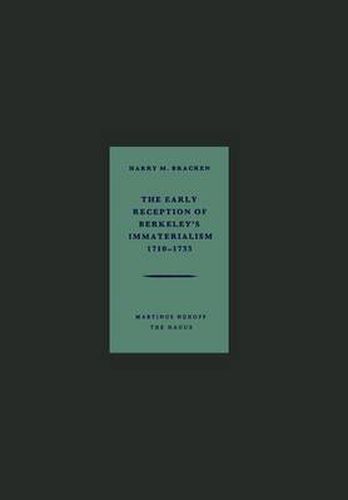Readings Newsletter
Become a Readings Member to make your shopping experience even easier.
Sign in or sign up for free!
You’re not far away from qualifying for FREE standard shipping within Australia
You’ve qualified for FREE standard shipping within Australia
The cart is loading…






This title is printed to order. This book may have been self-published. If so, we cannot guarantee the quality of the content. In the main most books will have gone through the editing process however some may not. We therefore suggest that you be aware of this before ordering this book. If in doubt check either the author or publisher’s details as we are unable to accept any returns unless they are faulty. Please contact us if you have any questions.
By the time of Immanuel Kant, Berkeley had been caIled, among other things, a sceptic, an atheist, a solipsist, and an idealist. In our own day, however, the suggestion has been ad vanced that Berkeley is bett er understood if interpreted as a realist and man of common sense. Regardless of whether in the end one decides to treat hirn as a subjective idealist or as a re alist, I think it has become appropriate to inquire how Berkeley’s own contemporaries viewed his philosophy. Heretofore the gen erally accepted account has been that they ignored hirn, roughly from the time he published the Principles 01 Human Knowledge until1733 when Andrew Baxter’s criticism appeared. The aim of the present study is to correct that account as weIl as to give some indication not only of the extent, but more important, the role and character of several of the earliest discussions. Second arily, I have tried to give some clues as to the influence this early material may have had in forming the image of the good Bish op that emerged in the second half of the eighteenth century. For it is my hope that such clues may prove helpful in freeing us from the more severe strictures of the traditional interpretive dogmas.
$9.00 standard shipping within Australia
FREE standard shipping within Australia for orders over $100.00
Express & International shipping calculated at checkout
This title is printed to order. This book may have been self-published. If so, we cannot guarantee the quality of the content. In the main most books will have gone through the editing process however some may not. We therefore suggest that you be aware of this before ordering this book. If in doubt check either the author or publisher’s details as we are unable to accept any returns unless they are faulty. Please contact us if you have any questions.
By the time of Immanuel Kant, Berkeley had been caIled, among other things, a sceptic, an atheist, a solipsist, and an idealist. In our own day, however, the suggestion has been ad vanced that Berkeley is bett er understood if interpreted as a realist and man of common sense. Regardless of whether in the end one decides to treat hirn as a subjective idealist or as a re alist, I think it has become appropriate to inquire how Berkeley’s own contemporaries viewed his philosophy. Heretofore the gen erally accepted account has been that they ignored hirn, roughly from the time he published the Principles 01 Human Knowledge until1733 when Andrew Baxter’s criticism appeared. The aim of the present study is to correct that account as weIl as to give some indication not only of the extent, but more important, the role and character of several of the earliest discussions. Second arily, I have tried to give some clues as to the influence this early material may have had in forming the image of the good Bish op that emerged in the second half of the eighteenth century. For it is my hope that such clues may prove helpful in freeing us from the more severe strictures of the traditional interpretive dogmas.